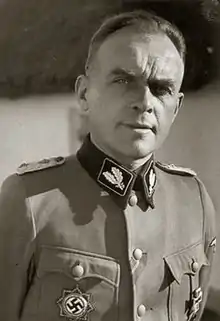Jürgen Wagner
Jürgen Wagner (9 September 1901 – 27 June 1947) was a Brigadeführer in the Waffen-SS during World War II, the commander of the SS Division Nederland and was awarded the Knight's Cross of the Iron Cross with Oak Leaves.
Jürgen Wagner | |
|---|---|
 With the rank of SS-Oberführer | |
| Born | 9 September 1901 Strasbourg, German Empire |
| Died | 27 June 1947 (aged 45) Belgrade, SR Serbia, SFR Yugoslavia |
| Cause of death | Execution by firing squad |
| Allegiance | |
| Service/ | |
| Rank | SS-Brigadeführer und Generalmajor der Waffen-SS |
| Service number | NSDAP #707,279 SS #23,692 |
| Unit | SS Division Nederland 4th SS Polizei Division |
| Battles/wars | World War II |
| Awards | Knight's Cross of the Iron Cross with Oak Leaves |
In April 1944 Wagner was promoted to SS-Brigadeführer und Generalmajor der Waffen-SS and given command of the 4th SS Polizei Division. In August 1944, Wagner was given command of a Kampfgruppe (battle group), against the Tartu Offensive of the Soviet 3rd Baltic Front.[1]
After the war ended, Wagner was extradited to Yugoslavia in 1947. There, he was put on trial before the military tribunal of the 3rd Yugoslav Army from 29 May to 6 June 1947 in Zrenjanin. It is not precisely known for what he was indicted. However, his orders for the mass executions of civilians in 1941 and later on reportedly played a role in his conviction. Found guilty of the charges, he was sentenced to death by firing squad and executed on 27 June 1947.[2]
Awards
- Iron Cross (1939) 2nd Class (16 May 1940) & 1st Class (1 July 1940)[3]
- German Cross in Gold on 8 December 1942 as SS-Standartenführer in SS-Infanterie-Regiment "Germania"[4]
- Knight's Cross of the Iron Cross with Oak Leaves
See also
References
Citations
- Hiio 2006, pp. 1035–1094.
- Böhme 1964, pp. 19–20.
- Thomas 1998, p. 407.
- Patzwall & Scherzer 2001, p. 492.
- Scherzer 2007, p. 764.
Bibliography
- Böhme, Kurt W. (1964). Zur Geschichte der deutschen Kriegsgefangenen des Zweiten Weltkrieges. Die deutschen Kriegsgefangenen in Jugoslawien 1949-1953. Vol. I/2, Gieseking, Ernst und Werner, GmbH, Verlag. ISBN 978-3-7694-0004-5.
- Hiio, Toomas (2006). "Combat in Estonia in 1944". In Toomas Hiio; Meelis Maripuu; Indrek Paavle (eds.). Estonia 1940–1945: Reports of the Estonian International Commission for the Investigation of Crimes Against Humanity. Tallinn.
{{cite book}}: CS1 maint: location missing publisher (link) - Patzwall, Klaus D.; Scherzer, Veit (2001). Das Deutsche Kreuz 1941 – 1945 Geschichte und Inhaber Band II [The German Cross 1941 – 1945 History and Recipients Volume 2] (in German). Norderstedt, Germany: Verlag Klaus D. Patzwall. ISBN 978-3-931533-45-8.
- Scherzer, Veit (2007). Die Ritterkreuzträger 1939–1945 Die Inhaber des Ritterkreuzes des Eisernen Kreuzes 1939 von Heer, Luftwaffe, Kriegsmarine, Waffen-SS, Volkssturm sowie mit Deutschland verbündeter Streitkräfte nach den Unterlagen des Bundesarchives [The Knight's Cross Bearers 1939–1945 The Holders of the Knight's Cross of the Iron Cross 1939 by Army, Air Force, Navy, Waffen-SS, Volkssturm and Allied Forces with Germany According to the Documents of the Federal Archives] (in German). Jena, Germany: Scherzers Militaer-Verlag. ISBN 978-3-938845-17-2.
- Thomas, Franz (1998). Die Eichenlaubträger 1939–1945 Band 2: L–Z [The Oak Leaves Bearers 1939–1945 Volume 2: L–Z] (in German). Osnabrück, Germany: Biblio-Verlag. ISBN 978-3-7648-2300-9.